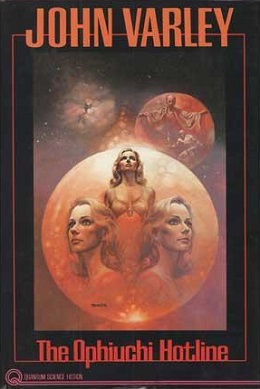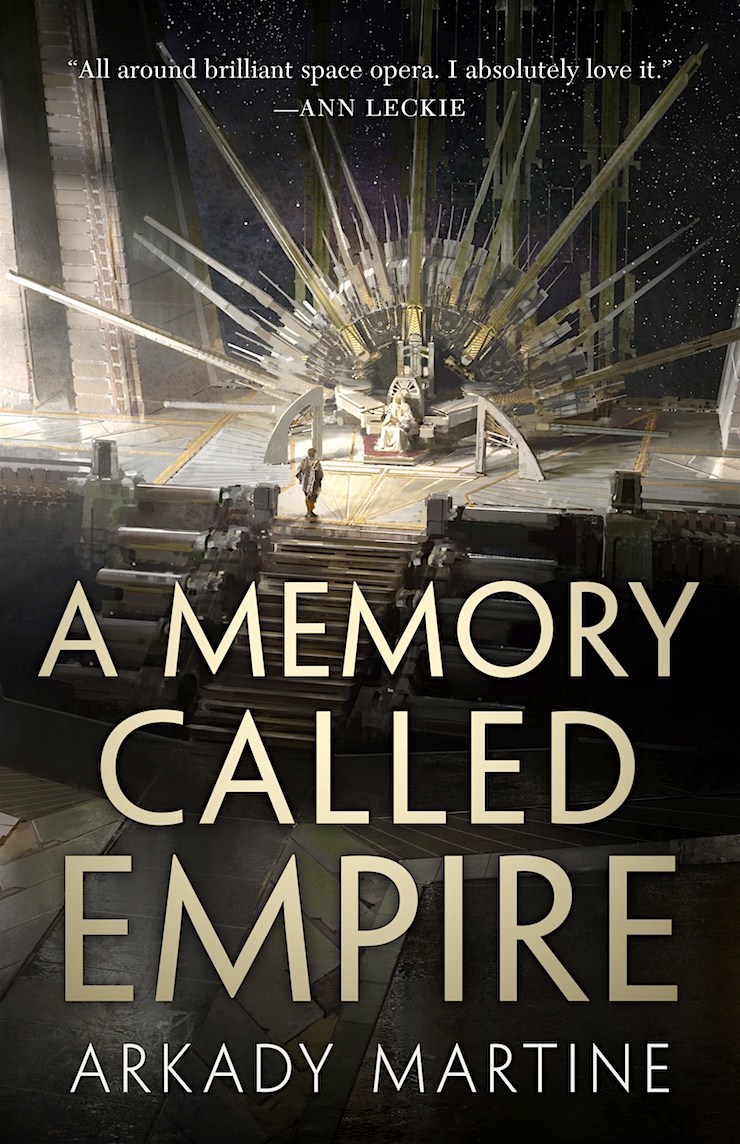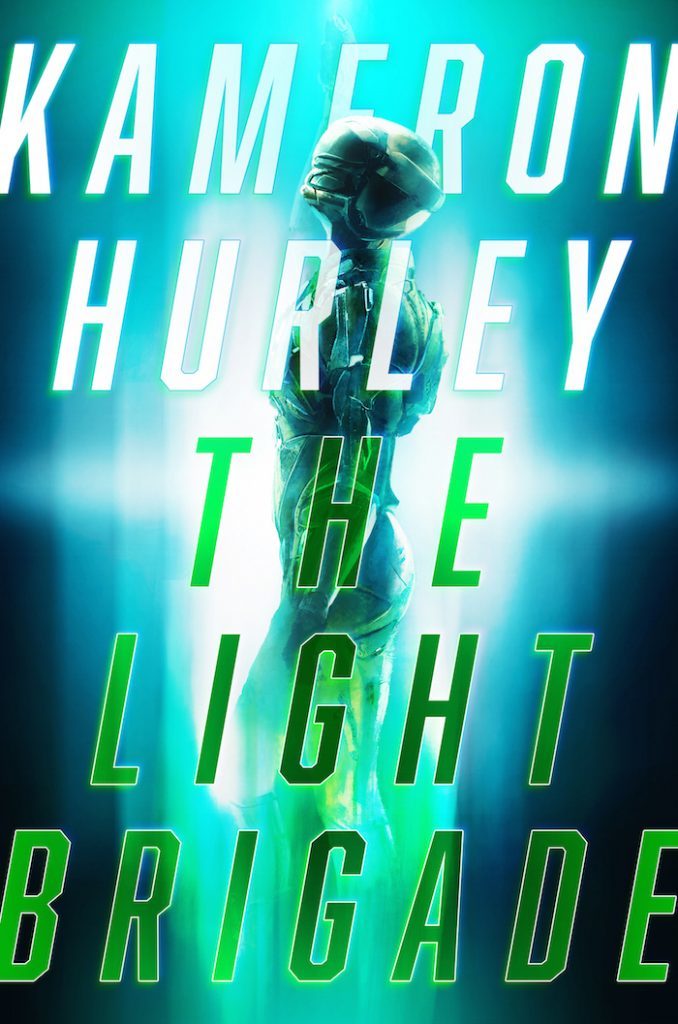 Galactic
Center series book #4.
Galactic
Center series book #4.Piloting an ancient starship, Killeen and the Bishop tribe escape the mech-ruled world of Snowglade. Seeking refuge on a far away planet, they discover vast wonders: an organic life-form as large as a world, a planet-coring cosmic string, a community of humans ruled by a brutal tyrant, and ultimately an alien race more awesome than any they have encountered. As they battle for survival against these myriad dangers, Killeen and his crew will gain an unforeseen ally—one that may determine humanity's true destiny...
This series continues to improve. Tides of Light builds on the series course correction that was Great Sky River. The book blurb summarizes the story pretty well. Whereas Great Sky River laid the groundwork for where the series now takes place, Tides of Light focuses more on how these tribes of humanity deal with each other and one another. The militaristic hierarchy is more prominent than I remember it being in Great Sky River, but if you're fighting for survival against intractable enemies every day, then I guess war is all you know.
The "alien race more awesome than any they have encountered" refers to the Cybers. I thought that was an odd name choice considering how cybernetically enhanced our Humans are here. But if you compare the two, the Humans are entry level cyborgs compared to these new aliens. And Benford does a great job of giving us their POV, particularly through the alien known as Quath. They look down on the Humans as being mere animals, but Quath comes to realize that they're something more.
The way the "organic life-form as large as a world" was introduced was a bit jarring. It seemed like Benford had gone off on a speculative tangent for the hell of it, but eventually he brought it back around into the story. Killeen's encounter with the planet-coring cosmic string also seemed like a physicist's thought experiment that was conveniently contrived because, well, he's an astrophysicist! Show off! ;-P But in the grand scheme of the story, Benford made it fit.
Speculative science and tech marvels aside, I think that at this point in Benford's career he finally got a good handle on characterization. I finally felt some attachment to these characters rather than being an dispassionate observer of the story's events (or worse). Even the Cyber Quath proved interesting. The tyrant was less so. He was two-dimensional, and it isn't until the end of the novel that we learn why; finding out earlier would've been a spoiler.
Overall, a good blend of speculative ideas and characterization.
4 stars.
\_/
DED
 This
one starts out well, is muddled in the middle, and then ends a bit disappointingly.
This
one starts out well, is muddled in the middle, and then ends a bit disappointingly.
 After
supremely advanced aliens invade Earth to liberate the planet's intelligent species—whales and dolphins—the
majority of humankind is exiled into space, where, by means of bioengineering, they begin to adapt to and thrive in
their unforgiving environments. Cutting-edge tech means that they can modify body parts, regularly store their
memories for cloning purposes and even merge with seemingly benevolent alien beings (known as symbs) to create
another entity altogether. The discovery of a steady—and mostly indecipherable—stream of data
originating from a star system 17 light-years away offers some kind of hope of advancing the species and
retaking the homeworld. But when the novel's protagonist (a series of successive clones named Lilo) travels
out to 70 Ophiuchi, what she finds may not be salvation for the human species but its damnation.
After
supremely advanced aliens invade Earth to liberate the planet's intelligent species—whales and dolphins—the
majority of humankind is exiled into space, where, by means of bioengineering, they begin to adapt to and thrive in
their unforgiving environments. Cutting-edge tech means that they can modify body parts, regularly store their
memories for cloning purposes and even merge with seemingly benevolent alien beings (known as symbs) to create
another entity altogether. The discovery of a steady—and mostly indecipherable—stream of data
originating from a star system 17 light-years away offers some kind of hope of advancing the species and
retaking the homeworld. But when the novel's protagonist (a series of successive clones named Lilo) travels
out to 70 Ophiuchi, what she finds may not be salvation for the human species but its damnation.
 Ambassador
Mahit Dzmare arrives in the center of the multi-system Teixcalaanli Empire only to discover that her predecessor, the
previous ambassador from their small but fiercely independent mining station, has died. But no one will admit that
his death wasn't an accident—or that Mahit might be next to die, during a time of political instability in
the highest echelons of the imperial court.
Ambassador
Mahit Dzmare arrives in the center of the multi-system Teixcalaanli Empire only to discover that her predecessor, the
previous ambassador from their small but fiercely independent mining station, has died. But no one will admit that
his death wasn't an accident—or that Mahit might be next to die, during a time of political instability in
the highest echelons of the imperial court.
 There's
been a murder on Preservation Station and Murderbot has been called in to solve the case!
There's
been a murder on Preservation Station and Murderbot has been called in to solve the case!
 The
Light Brigade: it's what soldiers fighting the war against Mars call the ones who come back... different. Grunts
in the corporate corps get busted down into light to travel to and from interplanetary battlefronts. Everyone is
changed by what the corps must do in order to break them down into light. Those who survive learn to stick to the
mission brief—no matter what actually happens during combat.
The
Light Brigade: it's what soldiers fighting the war against Mars call the ones who come back... different. Grunts
in the corporate corps get busted down into light to travel to and from interplanetary battlefronts. Everyone is
changed by what the corps must do in order to break them down into light. Those who survive learn to stick to the
mission brief—no matter what actually happens during combat.

 Johannes Cabal
sold his soul years ago in order to learn the laws of necromancy. Now he wants it back. Amused and slightly bored,
Satan proposes a little wager: Johannes has to persuade one hundred people to sign over their souls or he will be
damned forever. This time for real. Accepting the bargain, Jonathan is given one calendar year and a traveling
carnival to complete his task. With little time to waste, Johannes raises a motley crew from the dead and
enlists his brother, Horst, a charismatic vampire to help him run his nefarious road show, resulting in
mayhem at every turn.
Johannes Cabal
sold his soul years ago in order to learn the laws of necromancy. Now he wants it back. Amused and slightly bored,
Satan proposes a little wager: Johannes has to persuade one hundred people to sign over their souls or he will be
damned forever. This time for real. Accepting the bargain, Jonathan is given one calendar year and a traveling
carnival to complete his task. With little time to waste, Johannes raises a motley crew from the dead and
enlists his brother, Horst, a charismatic vampire to help him run his nefarious road show, resulting in
mayhem at every turn.
 In
the second installment of this rousing series, Fafhrd and the Gray Mouser journey from the ancient
city of Lankhmar, searching for a little adventure and debauchery to ease their broken hearts.
When a stranger challenges them to find and fight Death on the Bleak Shore, they battle demonic
birds, living mountains, and evil monks on the way to their heroic fate. Fritz Leiber’s witty
prose, lively plots, and superb characterizations stand the test of time.
In
the second installment of this rousing series, Fafhrd and the Gray Mouser journey from the ancient
city of Lankhmar, searching for a little adventure and debauchery to ease their broken hearts.
When a stranger challenges them to find and fight Death on the Bleak Shore, they battle demonic
birds, living mountains, and evil monks on the way to their heroic fate. Fritz Leiber’s witty
prose, lively plots, and superb characterizations stand the test of time.
 The
embattled Republic reels from the attacks of Grand Admiral Thrawn, who has marshaled the remnants
of the Imperial forces and driven the Rebels back with an abominable technology recovered from
the Emperor's secret fortress: clone soldiers. As Thrawn mounts his final siege, Han Solo and
Chewbacca struggle to form a coalition of smugglers for a last-ditch attack, while Princess
Leia holds the Alliance together and prepares for the birth of her Jedi twins.
The
embattled Republic reels from the attacks of Grand Admiral Thrawn, who has marshaled the remnants
of the Imperial forces and driven the Rebels back with an abominable technology recovered from
the Emperor's secret fortress: clone soldiers. As Thrawn mounts his final siege, Han Solo and
Chewbacca struggle to form a coalition of smugglers for a last-ditch attack, while Princess
Leia holds the Alliance together and prepares for the birth of her Jedi twins.
 The
dying Empire's most cunning and ruthless warlord, Grand Admiral Thrawn, has taken command of the remnants of
the Imperial Fleet and launched a massive campaign aimed at the New Republic's destruction. Meanwhile, Han
Solo and Lando Calrissian race against time to find proof of treason inside the highest Republic
Council—only to discover instead a ghostly fleet of warships that could bring doom to their
friends and victory to their enemies.
The
dying Empire's most cunning and ruthless warlord, Grand Admiral Thrawn, has taken command of the remnants of
the Imperial Fleet and launched a massive campaign aimed at the New Republic's destruction. Meanwhile, Han
Solo and Lando Calrissian race against time to find proof of treason inside the highest Republic
Council—only to discover instead a ghostly fleet of warships that could bring doom to their
friends and victory to their enemies.